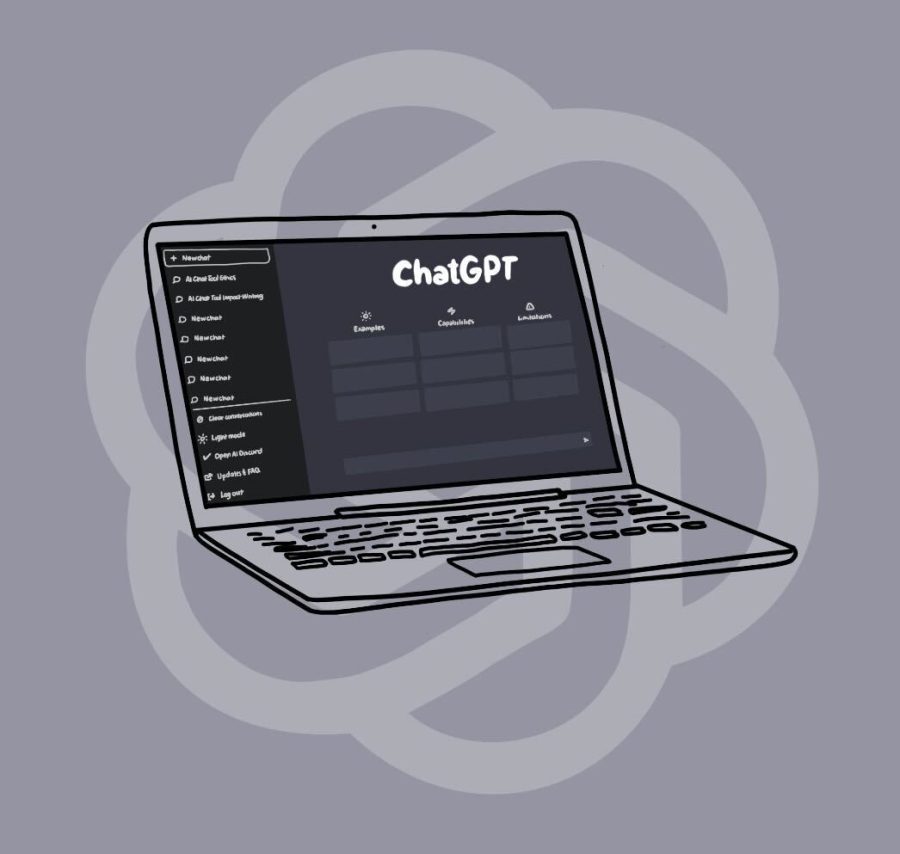ChatGPT Enters the Classroom as a New Form of Generative AI
The release of Chat GPT could have a great effect on education nationwide and change how students access information.
March 27, 2023
It may have seemed unthinkable years ago that a free, widely accessible software would have the power to pass prestigious tests like the SAT with a score of 1416 as well as pass a multitude of other well known assessments like AP exam, bar exam, and Wharton MBA exam. With the newly developed and updated generative AI, GPT-4, these high achieving ideals of extensive technological capabilities are being made a reality. In the past year, this software has changed the way that students access information, which led to varying degrees of cheating, but also paved the way for new opportunities in classrooms around the country.
Chat GPT gathers information from a wide variety of articles and texts from internet databases to analyze writing. The AI responds to an array of prompts and generates replies to requests for writing essays, poetry, and generating code.
“I feel like [Chat GPT] is definitely a cool innovation and machine but I think the whole thing with it being used by schools is that it is going to undermine education,” Benjamin Yu ‘24 said. “On a student level, the [effect on learning] will vary from person to person but people in my class have used it before.”
One of the biggest challenges that arises with generative AI is the issue of reliability and accuracy. For example, when Chat GPT is unable to piece together information correctly from its sources, it tends to make educated guesses which may lead to inaccuracies. Not only are some responses false or completely made up, the AI cannot provide information from events of the past year because it was developed in late 2022. Educators are dealing with the consequences of the new software and raising concerns about its usage for students.
“I think it’s really important that everybody understands the limits of the technology,” IB English teacher Dr. Joshua Plocher said. “I think that we have to equip students to deal with a world where a lot of this stuff is going to be used – it’s a powerful tool for things like disinformation campaigns.”
Chat GPT has proven to be an influential cheating tool in schools. This generative AI has the capability to assist students with writing essays not only because it can generate prompts and create an outline for the research paper, but it can also edit and review the entire essay with feedback. Companies like Turnitin.com are rushing to find a solution to detect generative AI in student’s writing.
Some students during the pandemic were already partaking in forms of cheating which hindered the development of certain writing and critical thinking skills. Instead of students formulating their own independent thoughts, this new chatbot will motivate students to rush to the internet to immediately find out the answer.
“I think that we’re losing language skills and [generative AI] is a threat to some language skills,” IB history teacher Ms. Kelly Saenz said. “People are afraid to write, and they dread it. This takes the burden off, but it also means they aren’t learning to process that way.”
With the emergence of Chat GPT and more generative AI technologies, teaching and assignments will have to change to reflect the output of more generative AIs.
“I think it’s about time that we changed a lot of the ways we assess student knowledge,” Ms. Saenz said. “I think one of the most important is the oral essay and that’s something that I used to do regularly. I didn’t care if a student didn’t know something, I could prompt them. We were getting through it together, that’s real knowledge and human communication. So this opens opportunities to reconsider some of those things. Question differently, teach differently.”
As for the way that classrooms will evolve to combat Chat GPT in schools, teachers and the administration are looking to set new rules in place for the future.
“I think the students can absolutely expect some clarifying communication to come out [soon],” Dr. Plocher said. “But there is just a lot of fog about this because it is new. Even with more traditional kinds of plagiarism, people sometimes have a hard time understanding that it’s more than just copy and paste. I think there’s a lot of education and establishment of norms and expectations that needs to happen with this new tool because it’s so new.”
It remains to be seen how schools will deal with the aftermath of the release of Chat GPT. Generative AI may become the tip of the iceberg for cheating or it has the capability to create options for students to use it as a study resource.
“We will see more and more generative AI just out in the world for all sorts of things,” Dr. Plocher said. “There has to be teaching about how [Chat GPT] is used, how you can use it, [and] what the limits are.”



